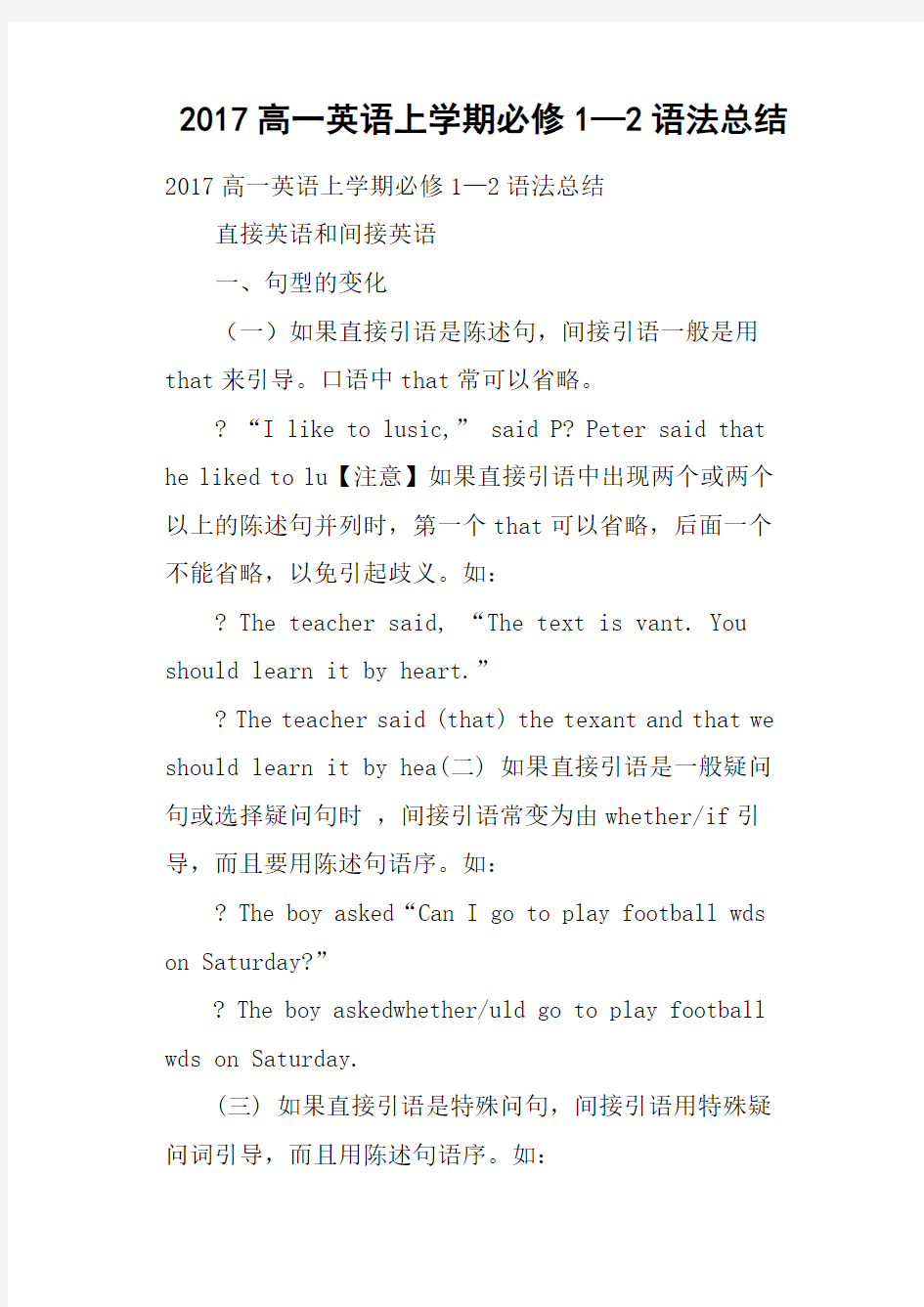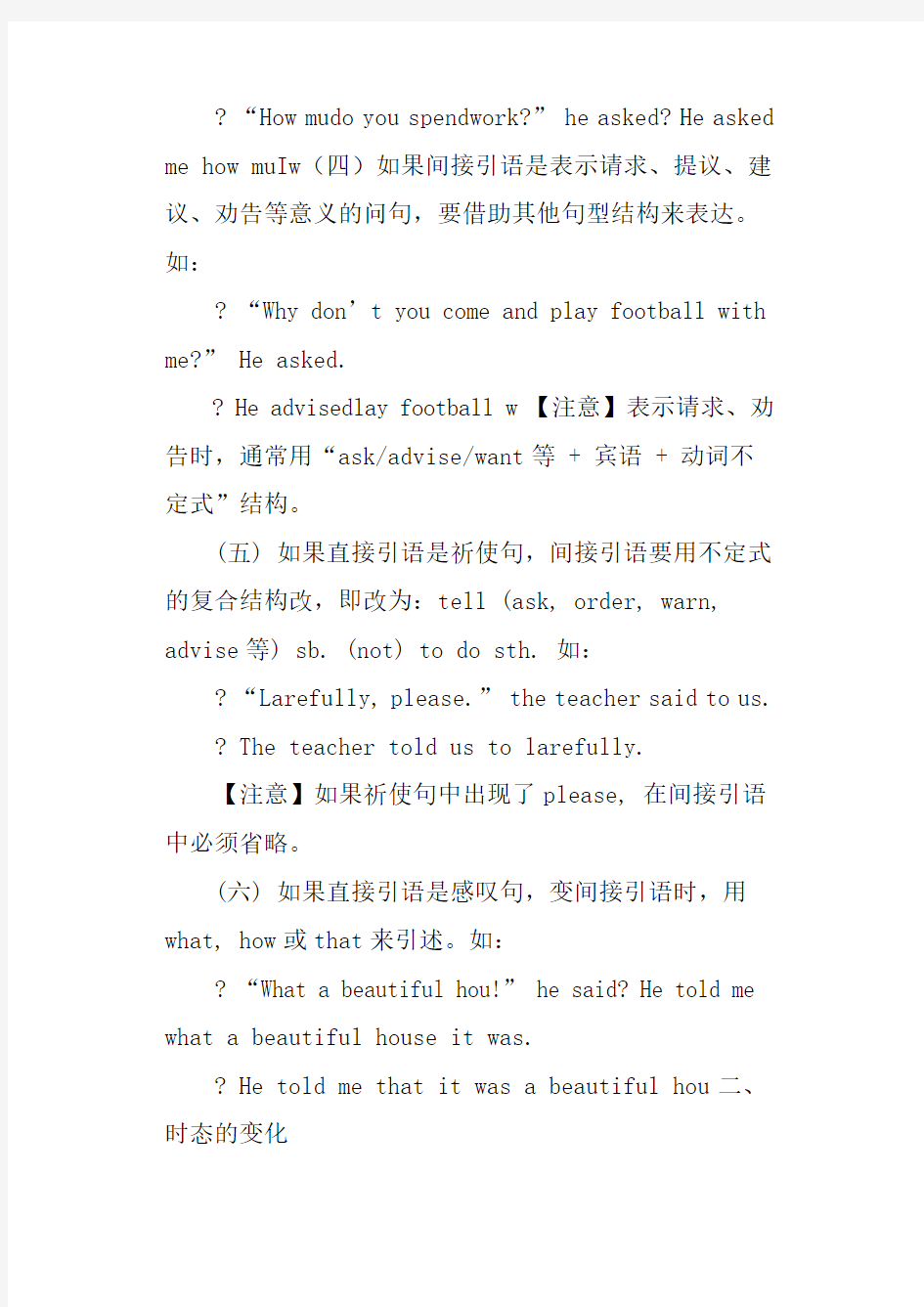2017高一英语上学期必修1—2语法总结


2017高一英语上学期必修1—2语法总结2017高一英语上学期必修1—2语法总结
直接英语和间接英语
一、句型的变化
(一)如果直接引语是陈述句,间接引语一般是用that来引导。口语中that常可以省略。
? “I like to lusic,” said P? Peter said that he liked to lu【注意】如果直接引语中出现两个或两个以上的陈述句并列时,第一个that可以省略,后面一个不能省略,以免引起歧义。如:
? The teacher said, “The text is vant. You should learn it by heart.”
? The teacher said (that) the texant and that we should learn it by hea(二) 如果直接引语是一般疑问句或选择疑问句时,间接引语常变为由whether/if引导,而且要用陈述句语序。如:
? The boy asked“Can I go to play football wds on Saturday?”
? The boy askedwhether/uld go to play football wds on Saturday.
(三) 如果直接引语是特殊问句,间接引语用特殊疑问词引导,而且用陈述句语序。如:
? “How mudo you spendwork?” he asked? He asked me how muIw(四)如果间接引语是表示请求、提议、建议、劝告等意义的问句,要借助其他句型结构来表达。如:
? “Why don’t you come and play football with me?” He asked.
? He advisedlay football w【注意】表示请求、劝告时,通常用“ask/advise/want等 + 宾语 + 动词不
定式”结构。
(五) 如果直接引语是祈使句,间接引语要用不定式的复合结构改,即改为:tell (ask, order, warn, advise等) sb. (not) to do sth. 如:
? “Larefully, please.” the teacher said to us. ? The teacher told us to larefully.
【注意】如果祈使句中出现了please, 在间接引语中必须省略。
(六) 如果直接引语是感叹句,变间接引语时,用what, how或that来引述。如:
? “What a beautiful hou!” he said? He told me what a beautiful house it was.
? He told me that it was a beautiful hou二、时态的变化
(一)如果主句的时态是一般现在时或将来时,则间接引语中的时态不变。如;
? He says, “I’d.”
? He says (that)d.
(二)如果主句的时态是一般过去时,则间接引语中的时态相应地变为与过去相关的时态。具体变化如下:一般现在时一般过去时现在进行时过去进行时
现在完成时过去完成时一般过去时过去完成时
过去完成时过去完成时一般将来时过去将来时
1) The old man said, “Great changes have taken plaa.”
The old man said that great changes had taken plaa.
2) “Wang Lin is waiting for you outsidl gate.” Li Fang saidLi Fang told me that Wang Lin was waitingutsidl ga【注意1】当转述的是客观事实、科
学真理、格言或谚语;重复出现或现在习惯性的动作时,间接引语的时态不变化。如:.
? “Failuuccess.” The teacher said to us.
? The teacher told us that failuu【注意2】当直接引语中的谓语动词含有情态动词mud, ougad better 等,变间接引语时,间接引语中谓语动词的形式不变。
如:
? He said, “You had better alp when you auble.” ? He said that I had better alp when I wauble.
三、人称代词的变化
直接引语变为间接引语时,间接引语中作主语的人
称代词或其他物主代词要作相应的变化。一般情况下要
遵循以下几条原则:
(一)直接引语的主语是第一人称,变为间接引语时,要和主句的主语保持一致。如:
? “Can I use your ba moment?” the boy said? The boy asked me wuld use my b(二) 直接引语的主语是第二人称,变为间接引语时,要和主句的宾语保持一致。如:
? The teacher asked Joan, “Why are you late again?”
? The teacher asked Joan why he was late aga (三)直接引语的主语是第三人称,变为间接引语时,间接引语中的主语人称不变。如:
? He asked me, “How long has Teddy stayeda?” ? He asked me how long Teddy has stayeda.
四、主句谓语动词的变化
(一) 直接引语是陈述句,谓语动词是say(said)的
不变,是said to sb.常变为told sb.如:
? He saidd, “I am gladu.”
? He toldd that he was glad(二) 直接引语是特殊疑问句、一般疑问句或选择疑问句,said 变为asked; said to sb. 变为 asked sb.如:
? “How can you do that?” Mary said to B? Mary asked Betty how she could do that.
(三) 直接引语是祈使句,变间接引语时,谓语动词可根据语气强弱选则beg, advise, ask, tell, order, warn等。如果祈使句是否定句,还需在不定式符号to前加not.如:
? I said“Please pass me a glass of water.” ? I askedass me a glass of wa(四) 直接引语是感叹句,变间接引语时,引述动词常用tell, exclaim或say等。如:
? “How well he looks!” Lucy said.
? Lucy exclaimed how well he looked.
? Lucy said that he looked well.
五、指示代词、时间状语、地点状语和方向性动词的变化
(一)指示代词的变化a(二)时间状语的变化
now then ago before / earlday that daday the day
bg/aag/aw the following/next daday aw in two days’day bday two days before / earlxt week/xt week/last week/week /month b【注意】如果在当天转述,时间状语也可不变。如:
? Mr. Black said, “I visited the Great Wall last year.”
? Mr. Black said that he had visited the Great Wall last year.
(三)地点和方向性动词的变化go
【注意】如果在当地转述,地点状语也可不变。如:He said, “I willvening.”
He said that he wouldvening. (同时同地引述) 巩固练习:将下列句子变为间接引语或直接引语He said“I wrote a larents last week.”
He _________ me that _______ ____ ______ a
l________ parents________ ________ ________.
2. “The suast andwest,”aiddaug__________ her daughter that the sun________ up the east and
_________w“Don’t be late aga” said the teacher. The teacher_______ _______ ________ ________ be late aga“Have youlm Harry Potter?” he asked.
He asked me ________ ________ ________ ________
the film Harry PWang asked the students howuld impro vgl“________ ________ ________ improve
________glish?” Mr Wang saidudld he had wweek before 2. toldldI hadHow can you your
定语从句
一.定语从句的定义定语从句在从句中起定语作用,修饰句中的某一名词或代词,被定语从句修饰的词叫先
行词。定语从句一般紧跟在先行词后面.(定语从句有时
候还可以修饰一个句子,通常指代一件事情)
2. 引导从句的关联词叫关系词, 关系词分为关系代词和关系副词, 他们的作用:
(1)引导作用
(2)替代(先行词)作用
(3)在定语从句中担当某个成分的作用
关系代词:who, whom, wat, which, as等(在句中作主、表、宾、定等成分)
关系副词:where, when, why在从句中作状语
e.g. The boy who bwindow is called Twho引导定语从句并代替先行词the boy在定语从句中充当broke
的主语
a.关系代词(who, whom, wat, whose)的指代关系及其选择
定语从句关系词的选择取决于先行词(被修饰词)在定语从句中的位置、成分。
指人
指物
在定语从句中的作用
Who
√
主语
宾语
W√
宾语
Which
√
主语
宾语
that
√
√
主语
宾语
w√
√
定语(whose和它所修饰的名词在从句中可以充当主语或宾语)
b.关系副词
(1) why 先行词是表示原因的名词(reason),关系词在从句中做原因状语表示原因
(2) where 先行词是表示地点的名词,关系词在从句中做地点状语表示地点
(3) when 先行词是表示时间的名词,关系词在从句中做时间状语表示时间g. Thaason why he was laTl where I have studiedaI will alwaber the day when I saw you定语从句有限制性和非限制性两种。
限制性定语从句是先行词不可缺少的部分,去掉它主句意思往往不明确,它对主句起到限制作用。
非限制性定语从句是先行词的附加说明,去掉了也不会影响主句的意思,它对主句起进行补充说明,它与主句之间通常用逗号分开。如果先行词是专有名词或独一无二的事物,我们一般要用非限制定语从句。
e.g. Tuse which we bought la (限制性)
The house, which we bought lav(非限制性)二.注意事项:
1.只能用which不能用that的情况:
① 引导非限制性定语从句
② 先行词在从句中作介词的宾语且介词前置, 即当关系词紧跟在介词后面时g. Tuse in which Lu Xun livedTuse which/that Lu Xun lived2.只能用whom不能用who的情况:
① 先行词在从句中作介词的宾语且介词前置,如
e.g. Tboy with whom I have talked wTboy who/whom
I have talked w关系代词必须用that的情形:
①当先行词被形容词的最高级所修饰
e.g. Tbest film that I have ev②当先行词被序数词修饰
e.g. Tar that arrived at the destination was driven b③当先行词被the only, the very等修饰
e.g. Tlat I gday.
Tvery book that I’m looking④先行词被all, evany, little(少量,一些), much等修饰时:
e.g. I’ve read all the books (that) you gav⑤当先行词为all, much, little(少量,一些), fewg, anything, everythingg等不定代词时,或者是在there be句型中 e.g. Ianything that I can du?
All that you have to dbuTat we can wa⑥当先行词既指人又指物时
e.g. He talked abouachers and schools that he had
visited.
⑦当关系代词在从句中作表语时:
e.g. Malonger the girl (that) she used to b定语从句中如果先行词是the way, 关系词常用 in wat或省略
5.关系代词和关系副词及其容易混用的情况
Tactory ______ I once worked. w2. Tactory ______ I’ve visited. that/wThe day __________ I
alwabat/wThe day ______ Nanjing was liberatedwThe reason _____ he hasn’at he has been ill. wDon’t believason _____ he give you. that
【注意】当表示时间,地点, 原因的名词, dalace, faason等作先行词,在定语从句中作状语时,用when, where ,why;在从句中作主语或宾语时,就用that或w 三. 介词 + 关系代词的情况
当我们在用带有介词的定语从句时,我们有两种选择,介词放在关系代词前或者是放在定语从句中。如: 1)The woman who/wlberg is married to is an aThe woman to wlberg is married is an a2)The painting at which I looked was painted by Vincent van GogThe painting which I looked at was painted by Vincent van Gogh.
那么如何选择介词呢:
1).介词与定语从句的先行词是一种习惯性的搭配g. The farm _______I once worked has taken on a new lw2).介词与从句中的动词是一种习惯性的搭配.
e.g. Wan ________our teaaking hands? with w).介词与从句中的形容词一起构成一种习惯性的搭配.
e.g. Ours is a beautiful country, _______we are greatly proud. of w).表示“所有格”或“整体中的部分” 时,用介词of.
e.g. There are ovusand wa0________ are ww练习1:关系副词或者是介词+关系代词填空
1)In the dawasn’t a singl_______ she could tul2)When you read the book, you’d better make a mark ________you have any
qu)Barcelona_____ the 25th Summer Olympic were heldwhom(turn to sblp 向某人求助) 2. wwhere/in w 练习2: 用介词+关系代词填空Do you lb$10?
2. Do you lbook ________she paid $10?Do you lblearned a lot?Do you lbalks?He built a
telescope(望远镜) he could studTa tall tree outside, ________ stands our teaa has a lvd longest
____________llow RivThe tower __________ people can
have a good viewllThe man ________ Ilast night is very good at wrestling.
10. He paid the boy $10 for washing ten window________ hadn’t been cleaned for at least a yea.on which 2.for which 3.from which 4.about which 5.through which 6.under wwwwhom 10. of w 四.as 引导的非限制性定语从句
比较并发现:
The eaund._____ is known to all. It
The eaund,_____ is known to all. which/ as
_____ is known to all, the eaund。 As
______ is known to all that the eaund. It 【注意】 as 具有正如之意,与之搭配的动词一般是固定的,如:as you know/ as you see/as we planned/as we expected
比较并发现:
Tame pen as I lost. 这本书和我丢的那本一模一样。 Taat I lost. 这本书就是我丢的那本。
【注意】the same … as表示相似事物,the same … that表示同一事物
比较并发现:
Tuch ag book _______ we all like. as
Tg a book _________ we all like. as
这是大家都喜欢的如此有趣的一本书。(定语从句) Tuch ag book _______we all lat
Tg a book _________we all lat
这本书如此有趣,大家都喜欢。(结果状语从句)
【注意】such (so)…as…引导定语从句,
such(so)…that…引导结果状语从句
被动语态与主动语态
一.语态概述
英语中有两种语态:主动语态和被动语态。
主动语态表示主语是动作的执行者。
被动语态表示主语是动作的承受者,即行为动作的
对象。
e.g. He opened the door. 他开了门。(主动句) The door was opened. 门被开了。(被动句) 二.被动语态的构成
被动语态由“助动词be+及物动词的过去分词”构成。人称、数和时态的变化是通过be的变化表现出来的。一般将来时的被动语态 will/ shall/ be to/ be going to +be d2. 现在完成时的被动语态 has/have been d现在
进行时的被动语态 be +being d歌诀是:被动语态be字变,过去分词跟后面。
三、被动语态的用法
(1)不知道或没有必要说明动作的执行者是谁。
e.gw computers were stolen last nig(2)强调动作的承受者,而不强调动作的执行者。g. The window was broken by Mike.窗户是迈克打破的。
四、主动语态变被动语态的方法
(1) 把主动语态的宾语变为被动语态的主语。
(2) 把谓语变成被动结构(be+过去分词)
(根据被动语态句子里的主语的人称和数,以及原
来主动语态句子中动词的
时态来决定be的形式)。
(3) 把主动语态中的主语放在介词by之后作宾语,将主格改为宾格。
e.g. I havdwThe homework has bd b歌诀是:宾变主,主变宾,by短语后面跟。
一.单项选择:( ) If the work ________, you can go and play gaAd B. had C. will bd Dd
2. ( ) It was raining heavily outsidldren were made ______laA. stay B. to stay C. staying D. stayed( ) Kate _______ the letter babedA. has written B. was wad written D. is writing( ) To make oubeautiful, rubbish ______vA. needn’t be thrown B. mustn’t be
thrown C. can’t throw D. maw( ) I like my bike. It ________ very well.
A. rides
B. is ridingdden D. has ridd( ) —I won’arty unless Tom ______—You mean if Tu’llA. will invite B. invvited D. is invited( ) Everyone who heard Mr. Green’_____________A. laughed at B. was laughed
C. laughed
D. was laughed a( ) The children must _______.
A. look after
B. be taken good care
C. lame
D. be taken good ca( ) The woman still doesn’t kn ow what _______wn
while she was away.
A. happens
B. happened
C. will happen
D. was happened
10. ( ) — I saw you wg.
—bike ___________.
Ading B. is being mendedded D. is being mending 1-5 DBCBA 6-10 DADBB
二.用正确的形式填空:All the students
__________(ask) to bring a kite wlast Sunday.
2. Are many ways _______(try)lutting down so ma?—What awuseum?
—_________(take) by American childThis coat _________(wash) welluld people ____________(speak) to politely?I’_________(警告)’ homewHe couldn’t explain why dinosaurs ___________ (消失)I’ll have my bike __________________(修理)wHave you found your necklace ________(偷) last week?
10. The PRC was _________(成立)b.were asked 2.tried 3.taken 4.washes 5.b.warned 7.disappeared 8.mended/repaired 9.stolen 10.founded
